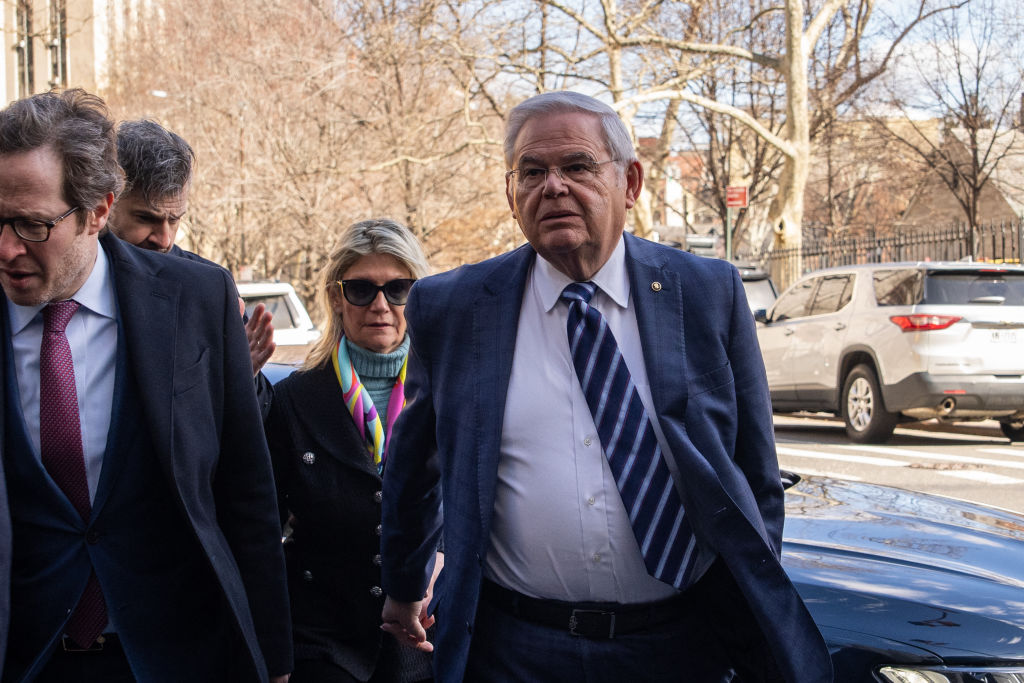If the flood of political fundraising pleas in your email inbox is any indication, political officeholders and hopefuls will spare no effort in raising money to win elections. However, when an elected official or candidate runs afoul of the law, can these political contributions foot the bill for their legal battles?
Former President Donald Trump has paid legal expenses stemming from assorted investigations and legal proceedings against him through donations collected by his leadership political action committee (PAC), Save America, which was created six days following the 2020 election.
New Jersey Sen. Bob Menendez, under an 18-count federal indictment on bribery and other charges, may have been taking notes. Though he recently declined to file for reelection in the Democratic primary, Menendez hinted at a possible independent bid to remain in the upper chamber of Congress.
“I am hopeful that my exoneration will take place this summer and allow me to pursue my candidacy as an independent Democratic in the general election,” Menendez said in a video message March 21. He has pleaded not guilty to the charges.
While an independent reelection bid is unlikely to return him to the Senate for another term, mounting such a candidacy would allow Menendez to raise campaign funds that could end up paying for his legal expenses stemming from the federal indictment against him.
What can campaign funds be used for besides just campaigns?
Federal regulations stipulate that campaign funds cannot go toward personal expenses but must pertain to the duties of a candidate or officeholder. For example, a candidate may use campaign funds to charter a bus to travel between campaign events, but cannot use those same funds to buy a new sports car.
“The rationale for this prohibition is that you don’t want donors unduly ingratiating themselves with candidates by essentially giving them bribes in the form of personal benefits disguised as campaign contributions,” Eric Wang, a partner at the Gober Group, a law firm specializing in campaign-finance among its areas of practice, and a senior fellow at the Institute for Free Speech, told The Dispatch.
Federal Election Commission (FEC) regulations provide the “irrespective test” to differentiate between personal and campaign expenses. According to this test, personal use refers to a “commitment, obligation or expense of any person that would exist irrespective of the candidate’s campaign or responsibilities as a federal officeholder.”
The FEC lists various expenses that are automatically considered personal use, such as household items, clothing, and tuition payment, to name a few.
But not all expenses are as clear-cut. Wang cautions that the distinction between campaign or officeholder expenses and personal use expenses can be hazy in some cases. “It’s often not a bright line distinction between exactly what is a campaign expense or personal expense,” he said.
The FEC also specifies that certain expenses are to be considered on a “case-by-case basis.” This includes meal expenses, travel and transportation, childcare costs, and legal expenses.
If the FEC determines that such legal expenses would not have occurred irrespective of the candidate’s campaign or duties as a federal officeholder, then the candidate’s lawyers and attorneys can charge the campaign credit card.
In 2005, amid a federal investigation into bribery allegations against former California Rep. Randy “Duke” Cunningham, the FEC permitted the use of his campaign funds to pay legal expenses related to the inquiry. In its advisory opinion, the FEC reasoned that since the bribery allegations related to Cunningham’s role as a federal officeholder, the legal fees wouldn’t have arisen irrespective of his campaign or duties.
This rationale also applies to Menendez’s situation, enabling him to allocate campaign funds toward legal expenses, said Wang. Most of the charges against Menendez have to do with allegedly accepting bribes—including half a million dollars in cash, a new Mercedes-Benz C300 convertible, and gold bars worth more than $100,000—to use his position as senator to benefit the government of Egypt. “He was indicted on bribery, and he could only have allegedly committed bribery as an officeholder and not as a private citizen,” Wang said. Therefore, his legal expenses stem from his duties as a federal officeholder.
According to FEC filings, Menendez’s campaign paid more than $2.3 million to five different law firms in the last quarter of 2023 in the wake of his September indictment (campaign expenditure reports from the first quarter of 2024 have yet to be released). However, the purpose of the expenditures, and whether they were related to the bribery case, was unclear.
In addition to using campaign funds, there are also other ways Menendez can pay for his legal bills. Menendez has set up a legal defense fund that raised $469,500 from the middle of July 2023 through the end of the year, of which he spent $373,223 in that same span, including $294,464 paid to four different law firms.
The “personal use” prohibition of campaign funds does not apply to PACs and party committees. Because of this distinction, Trump has mostly used the Save America leadership PAC to pay his lawyers rather than his presidential campaign account. However, this doesn’t preclude Save America from using the Trump presidential campaign to help raise money: Ten cents of every dollar donated online to the Trump campaign is given to Save America.







Please note that we at The Dispatch hold ourselves, our work, and our commenters to a higher standard than other places on the internet. We welcome comments that foster genuine debate or discussion—including comments critical of us or our work—but responses that include ad hominem attacks on fellow Dispatch members or are intended to stoke fear and anger may be moderated.
With your membership, you only have the ability to comment on The Morning Dispatch articles. Consider upgrading to join the conversation everywhere.